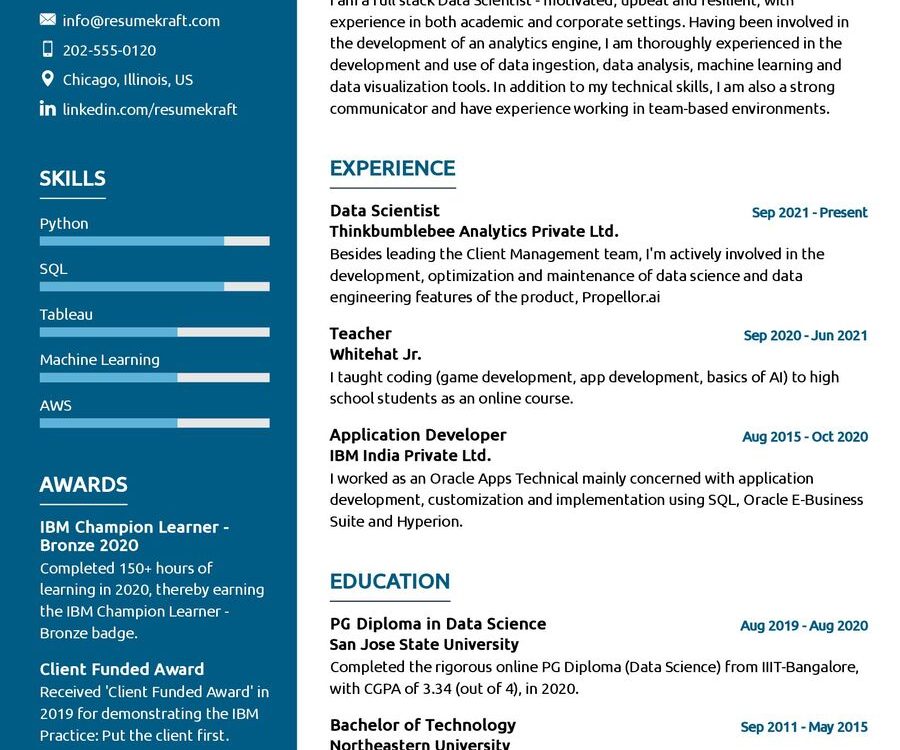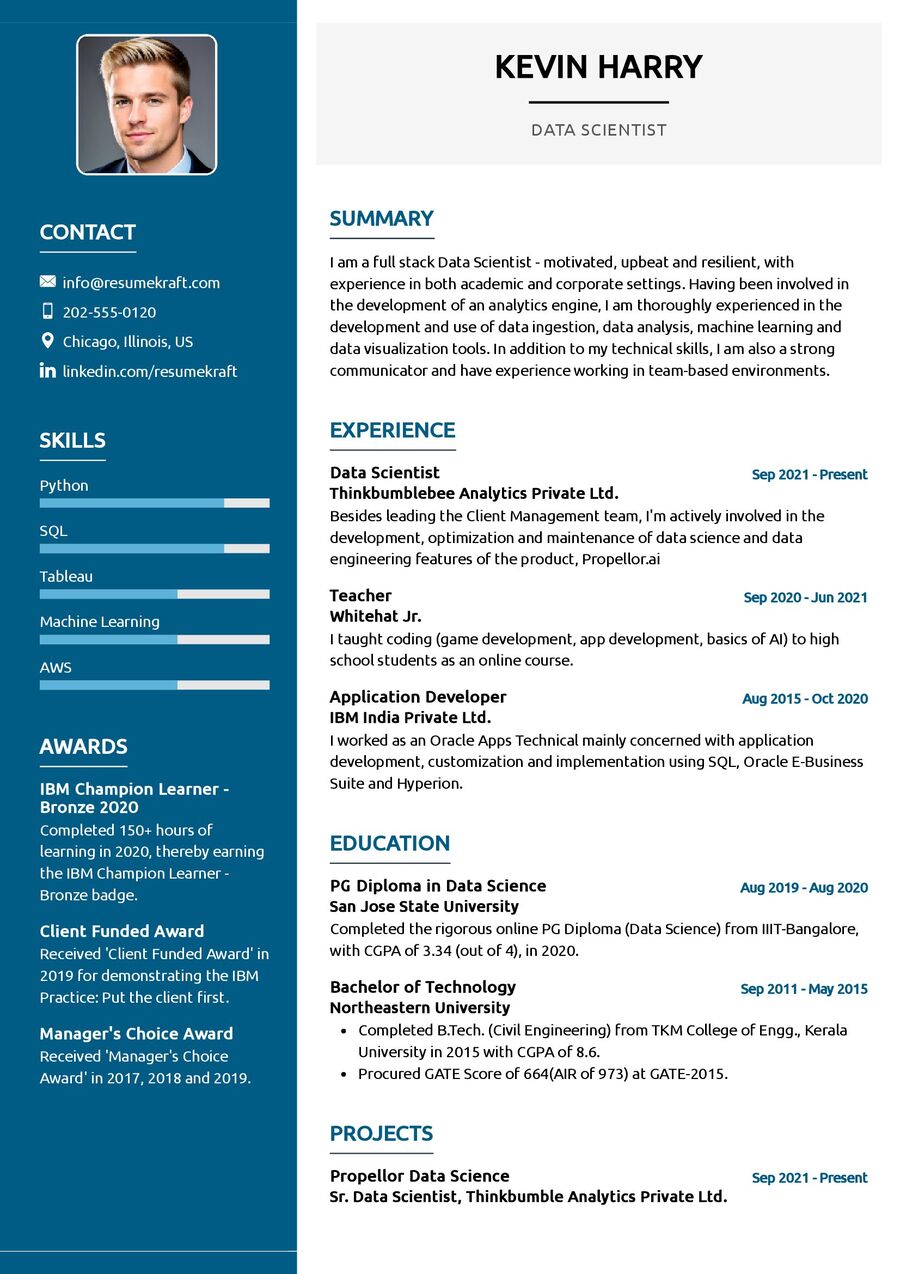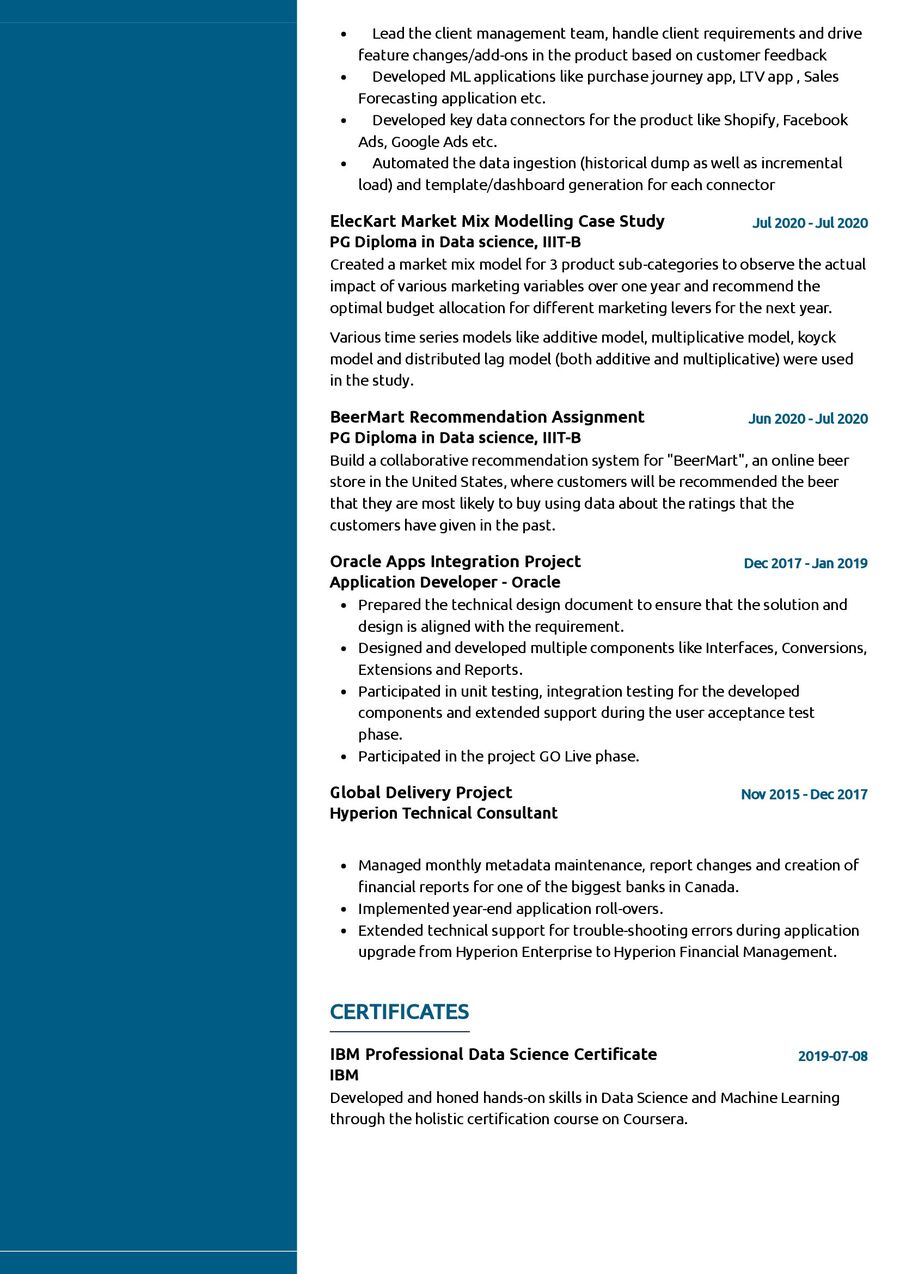What is the Role of a Data Scientist?
In the realm of modern business, the role of a Data Scientist has emerged as a linchpin for organizations striving to navigate the complexities of data-driven decision-making. This multifaceted position blends analytical prowess with strategic thinking, allowing businesses to glean invaluable insights and make informed choices. Let’s delve deeper into the intricate role of a Data Scientist, one that demands a profound understanding of data analysis techniques coupled with the ability to translate data into actionable business strategies.
A Data Scientist is entrusted with the task of deciphering complex data sets, extracting meaningful patterns, and providing invaluable insights that fuel informed decision-making. Their role often involves collaborating with cross-functional teams, understanding business objectives, and using advanced analytical tools to unlock the true potential of data. Data Scientists are instrumental in driving innovation and competitive advantage, shaping the future of businesses through data-driven strategies and predictive modeling.
What are the Data Scientist Job Requirements?
To embark on a successful career as a Data Scientist, one must fulfill a set of rigorous prerequisites, each serving as a stepping stone towards mastering the art of data analysis. Let’s explore the key requirements that pave the way to becoming a proficient Data Scientist:
- A Bachelor’s or Master’s degree in Computer Science, Statistics, Mathematics, or a related field, showcasing a strong foundation in data analysis and quantitative methods.
- Proficiency in programming languages such as Python, R, or Java, coupled with a deep understanding of data manipulation and analysis libraries.
- Experience in data visualization tools like Tableau or Power BI, enabling effective communication of complex data insights to stakeholders.
- Knowledge of machine learning techniques and algorithms, empowering the development of predictive models and data-driven solutions.
- Strong problem-solving and critical-thinking abilities, essential in identifying key business challenges and devising data-driven strategies to address them.
- Excellent communication skills, allowing for effective collaboration with both technical and non-technical teams, and the ability to convey complex findings in a comprehensible manner.
Continual upskilling and staying abreast of the latest trends in data science is crucial to thrive in this dynamic field.
What are the Responsibilities of a Data Scientist?
The role of a Data Scientist is an amalgamation of technical expertise and strategic acumen, woven together to unlock the potential of data and drive impactful business decisions. Let’s uncover the primary responsibilities that define the role of a Data Scientist:
- Collecting and interpreting complex data sets, extracting meaningful patterns and trends to facilitate informed decision-making.
- Developing and implementing data models and algorithms to analyze and predict business trends, enabling proactive decision-making and risk mitigation.
- Collaborating with cross-functional teams to understand business objectives and provide data-driven insights to drive innovation and achieve organizational goals.
- Creating data visualizations and reports to effectively communicate findings and recommendations to stakeholders, aiding in the understanding of complex data insights.
- Conducting thorough research to stay updated with the latest advancements in data science, implementing cutting-edge techniques to enhance data analysis processes.
- Ensuring data integrity and security, adhering to industry best practices and regulatory standards to maintain data privacy and confidentiality.
- Identifying opportunities for process optimization and improvement through data analysis, contributing to the overall efficiency and effectiveness of business operations.
Each responsibility demands a keen eye for detail and a deep understanding of the business landscape to drive meaningful outcomes.
Data Scientist CV Writing Tips
As you embark on the journey of crafting a compelling CV that highlights your proficiency as a Data Scientist, keep in mind that your CV is a reflection of your expertise, achievements, and potential. Here are some tips to help you construct a CV that stands out in the competitive job market:
- Emphasize your experience in handling complex data sets and deriving actionable insights, showcasing instances where your analytical skills have made a tangible impact.
- Highlight your proficiency in programming languages and data manipulation tools, underscoring your ability to work with diverse datasets and extract meaningful information.
- Include specific examples of projects where you implemented machine learning techniques and algorithms, demonstrating your capability to develop predictive models and drive data-driven solutions.
- Detail your communication skills and experience in collaborating with cross-functional teams, illustrating your ability to convey complex findings to non-technical stakeholders effectively.
- Personalize your CV for each application, aligning your skill set and experience with the specific requirements of the role and the organization.
Each tip is a testament to your expertise and your ability to leverage data for informed decision-making.
Data Scientist CV Summary Examples
Your CV summary serves as an introduction to your professional journey, highlighting your key skills and experiences in the field of data science. Craft a compelling summary that encapsulates your expertise and value proposition. Here are some examples to inspire you:
- “Diligent Data Scientist with over 8 years of experience in analyzing complex data sets, skilled in leveraging machine learning algorithms to drive data-driven business solutions.”
- “Results-driven Data Scientist proficient in programming languages like Python and R, adept at interpreting data to provide actionable insights and facilitate informed decision-making.”
- “Innovative Data Scientist with a strong background in statistical analysis and predictive modeling, experienced in collaborating with cross-functional teams to drive business growth through data-driven strategies.”
Each summary is an invitation for recruiters to delve deeper into your expertise and contributions in the field of data science.
Create a Comprehensive Experience Section for Your Data Scientist CV
Your experience section serves as the backbone of your CV, illustrating your professional journey and highlighting your key achievements and contributions. Craft this section to showcase your impact and value addition in previous roles. Here are some examples to guide you:
- “Led a data analysis team in a fast-paced tech company, where we successfully identified key trends and customer behaviors, leading to a 15% increase in customer acquisition and retention rates.”
- “Pioneered the implementation of advanced data models and algorithms in a leading e-commerce firm, resulting in a 25% improvement in sales forecasting accuracy and inventory management efficiency.”
- “Developed comprehensive data visualization reports for senior management, enabling them to make strategic decisions based on data-driven insights, resulting in a 30% increase in revenue within six months.”
Each experience narrates your role in driving impactful business outcomes through data analysis and strategic decision-making.
Education Section for Your Data Scientist CV
Your educational background serves as a testament to your foundational knowledge and expertise in the field of data science. Highlight your academic achievements and any relevant certifications. Here’s how you can structure your education section:
- Master of Science in Data Analytics, XYZ University, a journey of deep learning and specialization, 2016.
- Bachelor of Science in Computer Science, ABC University, the foundation stone of your data science career, 2012.
- Certification in Machine Learning, Coursera, showcasing your commitment to continuous learning and skill enhancement, 2017.
Each educational milestone signifies your dedication to mastering the craft of data science and staying updated with the latest industry trends.
Data Scientist Skills for Your CV
Your skill set as a Data Scientist encompasses a diverse range of technical and analytical abilities that contribute to your effectiveness in the field. Highlight your proficiency in both technical and soft skills to showcase your holistic capabilities. Let’s list down the essential skills that a Data Scientist should possess:
Technical Skills:
- Proficiency in programming languages such as Python, R, or Java, essential for data manipulation and analysis.
- Expertise in data visualization tools like Tableau or Power BI, enabling effective communication of complex data insights to stakeholders.
- Familiarity with machine learning algorithms and techniques, empowering the development of predictive models and data-driven solutions.
- Advanced knowledge of statistical analysis methodologies, crucial for interpreting complex data sets and deriving meaningful insights.
- Experience with big data technologies like Hadoop and Spark, facilitating the handling and analysis of large-scale data sets efficiently.
Soft Skills:
- Analytical thinking and problem-solving, vital in identifying key business challenges and devising effective data-driven strategies.
- Effective communication and collaboration, essential for conveying complex findings and insights to both technical and non-technical stakeholders.
- Attention to detail, necessary for ensuring accuracy and precision in data analysis and reporting.
- Adaptability and a willingness to learn, crucial for staying updated with the latest advancements and trends in data science.
- Time management and organizational skills, enabling efficient handling of multiple projects and deadlines simultaneously.
Each skill is a testament to your ability to leverage data effectively and drive impactful business outcomes.
Most Common Mistakes to Avoid When Writing a Data Scientist CV
As you craft your CV, it is imperative to avoid common pitfalls that can hinder your chances of landing your dream job. Here we list down the mistakes often seen in CVs and how to steer clear of them:
- Using generic language and phrases, a practice that fails to highlight your unique skills and experiences as a Data Scientist.
- Omitting specific examples and metrics that demonstrate the impact of your work, which can diminish the credibility of your achievements.
- Neglecting to tailor your CV to the specific job requirements, missing the opportunity to showcase your fit for the role and the organization.
- Overloading your CV with technical jargon, making it challenging for non-technical recruiters to grasp your expertise and value proposition.
- Failing to proofread your CV for errors and inconsistencies, which can leave a negative impression on recruiters and hiring managers.
Avoid these common mistakes to ensure your CV is a compelling reflection of your expertise and suitability for the role of a Data Scientist.
Key Takeaways for Your Data Scientist CV
As we conclude this comprehensive guide, let’s recap the key points to keep in mind while crafting your Data Scientist CV:
- Highlight your expertise in handling complex data sets and deriving actionable insights to drive informed decision-making.
- Showcase your proficiency in programming languages and data manipulation tools, underscoring your ability to work with diverse datasets effectively.
- Emphasize your experience in implementing machine learning techniques and algorithms, demonstrating your capability to drive data-driven solutions and business growth.
- Personalize your CV for each application, aligning your skill set and experience with the specific requirements of the role and the organization.
Finally, feel free to utilize resources like AI CV Builder, CV Design, CV Samples, CV Examples, CV Skills, CV Help, CV Synonyms, and Job Responsibilities to create an impressive application and prepare for the Data Scientist job interview.



